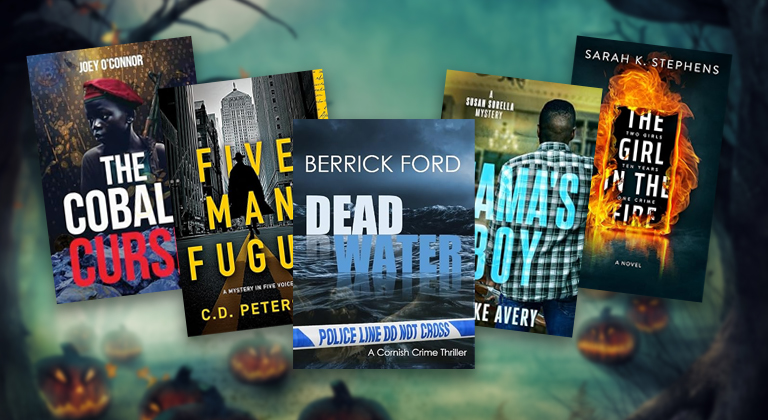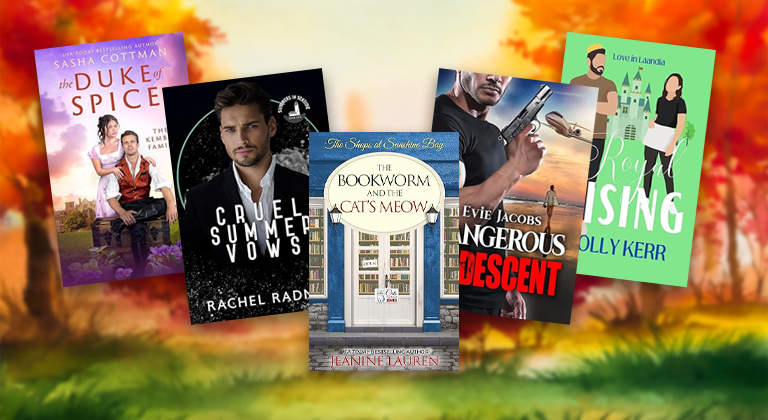How Amazon Democratized Book Reviews
Amazon’s Kindle Direct Publishing program revolutionized the publishing industry – allowing anybody with a laptop to follow their dreams of becoming a writer. In the same vein, Amazon also revolutionized book reviews; taking the power of showcasing (or bashing) a book out of the hands of an editorial elite and letting anybody have their say. It’s one of the best things to ever happen to publishing – and here’s why.
Before I became a whatever-the-hell-I-am-now, I tried my hand at many different careers. My first job was scrubbing foxhounds at the local county hunt, and since then I’ve also tried garden shed installation, radio sales, copy-writing and bar tending – all with various degrees of success (my Sapphire Martini is world-class, by the way.)
When I first moved to America, I got a very curious job reviewing erotic books for a now-defunct online newspaper The Sex Herald, and this was way back in the day before self-publishing took over. Every week I’d trudge back from their offices on the Upper West Side with a plastic bag full of paperbacks and try to spin some opinion about erotic anthologies and story collections edited and published by independent publishers like Cleis Press.
I learned very quickly the power and privilege a book reviewer has.
Back in those days, book reviews were written by people with connections at newspapers and magazines, and the whole business of Advanced Reader Copies (ARCs) was handled very differently. Off the back of The Sex Herald I got the opportunity to review more mainstream books for The Hampshire Chronicle and other publications, and also started to receive ARCs directly from publishers and stores like Barnes & Noble.
It was interesting because many of my friends who were into books and reading thought that this little gig of mine was kind of cool – and, I’m not going to lie, I started to get a bit full of myself with it.
I mean, c’mon. Publishers were sending me books. Real, printed books! And people were publishing my reviews! I was important! My opinion mattered! Not just anybody could write book reviews!
And that’s really the issue. I got my gig reviewing books not necessarily because I was some wise and enlightened literary expert. It’s because I could hammer out 300 words with 24-hours notice on a consistent basis, and sometimes (more often than not, actually) I’d do so for less than the price of a Starbucks coffee. At the risk of offending a lot of people who did what I did back in the day, most other book reviewers were just as convenient and disposable as I was. The sad thing is that I just didn’t realize it at the time.
In fact, I was insufferable. I genuinely believed that because people sent me books, and because people published my reviews, and because a lot of other people didn’t have this privilege, the stuff that I wrote was somehow as valuable as the stuff that I reviewed. Except… it wasn’t.
I got a wake-up call way back in 2009 when I reviewed a book called Frenzy: 60 Stories of Sudden Sex edited by Alison Tyler. It was a compilation of quickies, all assembled by renowned editor Alison Tyler, who had been titled “Erotica’s Own Superwoman” by the East Bay Literary Examiner even back in those heady days in which books were printed on paper and had pages.
I approached that review with the same devil-may-care, balls-out attitude that I’d taken to reviewing pretty much everything at the time – after all, people sent me free books! People published my articles! I was important!
I look back at what I wrote, nearly ten years later, and it makes me cringe.
“Frenzy contains a plethora of prose,” I opened the review with, “with stories ranging from 8-10 pages to ‘flash-fiction’ that’s barely a paragraph long.”
“You don’t read Frenzy like a normal book.” I waxed lyrical. “It’s not to be plodded through from cover to cover, but dipped into whenever you want a sinful snippet to savor. As such, the variety in length and style makes these stories particularly rewarding to sift through.”
I really loved alliteration, didn’t I?
Some of the stories I was very complimentary to – but not all of them. In fact, you can almost see the smug little smile on my face as I typed: “Erotica attracts the worst from our writing brethren and a few examples slipped under the radar of Alison Tyler’s normally excellent editing. The worst was ‘Madrid’, by Nikki Magennis – an interminable erotic contrivance that was both pretentious and amateurish to boot.”
Let’s forget the arrogance of the fact that I’d mentioned my ‘writing brethren’ – back in 2009 I hadn’t published anything except these featherweight reviews and a few short stories for Hustler – and focus on the dripping vitriol I so carelessly typed about Nikki Magennis‘ writing. For those of you who don’t know, Nikki is an excellent writer and editor of the FeatherLit ezine, and while I am sure her writing has evolved and improved over the years, she still didn’t deserve me writing that about her story. I mean, let’s cut to the chase – I’m pretty sure nothing I could have written at the time would have met Alison Tyler’s standards for inclusion in her anthology, and it’s just a supreme act of classlessness for me to have written what I did about the writing of another author – writing that was inherently and objectively superior to my own writing.
And to be honest, I would have thought nothing of it. I clicked ‘save’, sent it off to my editor, and then went off and had a glass of wine. I never would have given Nikki Magennis another thought…
…if it wasn’t for what happened next.
Alison Tyler somehow stumbled upon my review of her book, and had a few choice words to say about it. She was very chill – which is pretty much Alison in a nutshell – and dryly wrote this:
“The reviewer liked the book. Mostly. But eviscerated a few of the contributors in passing. Sort of casually. Like you might swat a mosquito.”
I don’t have a link to the original article, or the one that prompted it, but I remember her very coolly, calmly and classily dissecting my review and it was like somebody dunked a bucket of cold water on my head. I read what she wrote and it immediately made me think of that old Disney movie Ratatouille, in which the famed culinary critic Anton Ego is served a helping of humble pie and writes the following:
“In many ways, the work of a critic is easy. We risk very little yet enjoy a position over those who offer up their work and their selves to our judgment. We thrive on negative criticism, which is fun to write and to read. But the bitter truth we critics must face, is that in the grand scheme of things, the average piece of junk is probably more meaningful than our criticism designating it so.”
And that was me. Totally. I enjoyed the incredible privilege of getting free books containing the passion and hard work of aspiring authors, and I swatted their aspirations down with undeserved arrogance. I’d totally lost sight of what it was a reviewer was meant to do – and I’d started to believe that my criticism was as creative as their writing; and nothing could be further from the truth.
And you know what? Back in 2009 – and long before – this was the issue with book reviews in general. They were the domain of a small circle of connected elite. It was pretentious egotists like me who got free books, and had our reviews published, and thought that our opinions were somehow more important than anybody else’s. And the honest fact is, by keeping book reviews within such a small circle, the very thing they were intended to be ended up corrupted.
And I speak from experience. I’ll admit that when I got sent a ‘swag bag’ with an ARC, I’d be more likely to leave that book a positive review. When I got invited to cocktails and nibbles in New York for the launch of a new book, I’d be more likely to give that book some glowing coverage. When an author agreed to an interview for my personal blog, you’d better believe I waxed lyrical about them in my published review.
The fact is, I enjoyed a position of privilege, and I abused it. And many other reviewers did, too. Book reviews were less about the books themselves and more about how the publisher approached you, what relationship you had with the author, or how spinning the review would impact your little circle of influence.
It was a reflection of publishing as a whole. Traditional publishing was a very tough business to break into, and a lot of the time influence and networking was more important to seeing your books in print than actual talent. In fact, all you need to do is look at the prodigious success of many self-published authors – like Amanda Hocking – to see that publishers routinely rejected very talented writers. The irony was that traditional publishers styled themselves as the gatekeepers of quality and talent, but often had a very bumpy track-record with their books. Publishers thrive thanks to their occasional best-sellers, whereas the majority of books barely sell upwards of 2,000 copies over the course of the first few years. And those best-sellers aren’t easy to predict. That’s why more and more rejection letters have been sent out in recent years, and why publishers continue to drive established (i.e. safe) authors to write more and more, and give contracts to celebrities or other people who have ‘pull’ instead of talent.
And then Amazon came along, and everything changed.
In terms of publishing, suddenly everybody could get their books into an open marketplace – and they did. Today, self-published authors sell more books than the top five publishing houses combined, and successful self-published books are as tightly-edited, well-marketed and professional-looking (sometimes much more so) as anything traditional publishers produce.
And that “democratization” of publishing extended to book reviews, as well.
Now instead of pretentious egotists like me having the only say about which books got reviewed and what got said about them, anybody with a (qualified*) Amazon account and an opinion could post their review of a book on the product page. Not only that, but these reviews tended to be the ones that potential customers saw first. Instantly it swept the legs out from under traditional book reviews; and even as a former reviewer myself, it was not before its time.
Amazon reviews are different than the book reviews you’ll see in the New York Times or even flash-in-the-pan online papers like the one I wrote for. They’re generally from people with regular jobs, and regular lives, and the only motivation they have for writing a book review is that they want to share their opinion of it. They didn’t get invited to cocktails and nibbles with the author, they don’t get preferential treatment from the publishers, and they’re not being pressured to churn out a weekly column by an eager editor.
It intrinsically makes those reviews more valuable – and that’s precisely why Amazon put so much stock in them. It put book reviewers like me out of business, but I don’t think that’s a bad thing at all. Everything about Amazon’s reader reviews are more authentic; even down to how inconsistent they can be. It’s funny to look at a book and see competing 5 and 1 star reviews; but if those reviews have any context to them, even the ‘bad’ reviews can help convince a potential customer to buy a book.
As a natural reaction to Amazon’s review system, the concept of Advanced Reader Copies evolved. Free copies were no longer limited to newspaper or magazine reviewers like me. Digital-only copies were shared with closed groups of “ARC reviewers” and that’s where programs like our own Hidden Gems originated. These book reviewers aren’t hoity-toity journalists or pretentious people like me – they’re just passionate readers, fans of genre books, and folks with an opinion on what makes for good reading.
I think it’s one of the best things to ever happen to publishing – even though, as an author, those same reviewers can often drive me bananas with the things that they get upset about (for example, one of my romance titles once got a 1-star review because the heroine wasn’t pregnant in the final chapter). However, these book reviews don’t just help Amazon sell books – they also help authors evolve and become better. The feedback real readers give in their reviews is inherently more valuable than ‘official’ editorial reviews because there isn’t any agenda attached to it. Nobody is trying to flatter an author when they leave a 5-star review, or generate clickbait when they post a scathing 1-star review. These are just people’s genuine thoughts; whether they paid for the book themselves, or received it as an ARC.
With book reviews carrying so much weight on Amazon, it’s such a valuable and meaningful contribution to write your own. I encourage anybody and everybody who lives to read to make sure they share their thoughts with Amazon’s customers. But, more than that – it also makes sure that (former) idiots like me don’t get away writing pretentious twaddle or accuse books of being an ‘erotic contrivance’ like I did to poor Nikki Magennis.
It’s ironic that when Alison Tyler called me out for my review, I considered that line from Ratatouille; “the average piece of junk is probably more meaningful than our criticism designating it so.”
Now that Amazon has democratized the review process, and given everybody an opportunity to review books just like they’ve given everybody an opportunity publish them…
…well, our criticism now has more value than it ever did before.
Go out and write some book reviews, people – or, if you haven’t already, sign up to Hidden Gems and receive free ARCs of some of the hottest and most exciting new books in whatever genres you like to read.












3 Comments